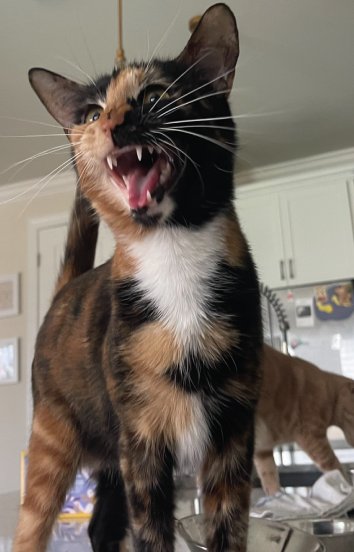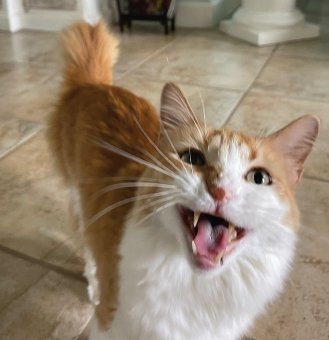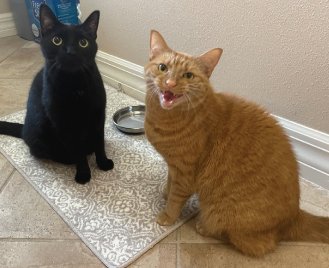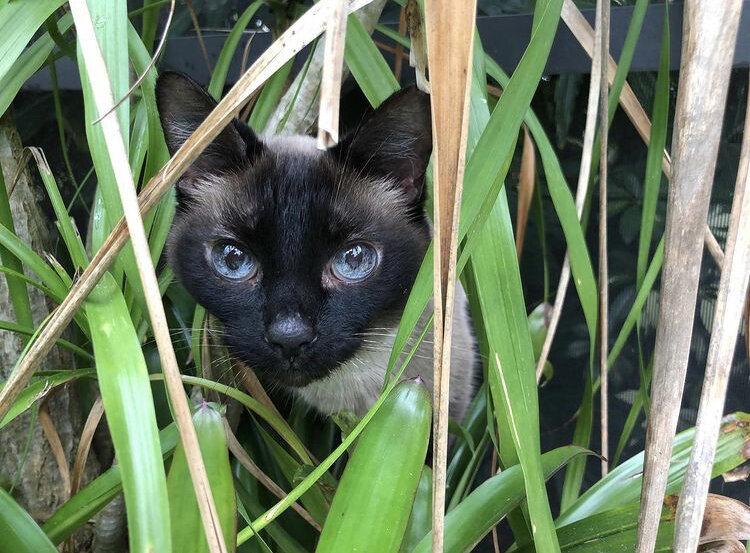5 Things To Do When Your Dog Won’t Potty Outside In Bad Weather
Dealing with a dog that refuses to potty in the rain can be frustrating, but with the right strategies, it’s possible to make it easier for you and your pup. In this blog, we’ll share five helpful tips for getting your dog comfortable outside in the rain.
Look for a covered area to potty
Looking for a covered area, such as a large tree or large umbrella, for your dog to potty during bad weather can provide a sense of security and comfort. A sheltered spot can encourage your dog to go outside when they might otherwise hesitate, ensuring they get the bathroom break they need.
Wear rain gear
Wearing rain gear like a raincoat and booties can make potty time more comfortable for you and your dog during bad weather. The raincoat keeps your dog dry and warm, while the booties protect their paws from getting cold or wet, preventing discomfort or irritation. This can make them more willing to go outside and do their business, as it reduces the negative impact of the weather on their experience. Plus, it helps keep them clean and dry when they return inside.
Get your dog used to the rain
To slowly start taking your dog outside in the rain, expose them to light rain for short periods. Use positive reinforcement like treats and praise when they go outside, even if they just stand there. Gradually increase the time spent outside and the intensity of the rain as they become more comfortable.
Try pee pads
If your dog refuses to go outside in the rain, you can try using pee pads as a temporary solution. Set up a designated potty area with a pee pad in a quiet, easy-to-access spot inside. Encourage your dog to use the pad by guiding them over it and offering praise or treats when they go. Over time, they may learn to associate the pad with potty time, especially during bad weather.
Bring their favorite toy
Bringing your pup's favorite toy outside during potty time in the rain can help distract them from the discomfort of the wet weather and make the experience more enjoyable. The toy can serve as a positive reinforcement, offering something familiar and fun to focus on while they do their business.
Every pup is different, so be patient and try different strategies to see what works best for your furry friend. After all, April showers bring May flowers!
https://pethelpful.com/dogs/dog-refusing-to-go-potty-in-the-rain
https://goodbuddydogtraining.com/my-dog-wont-go-pee-in-the-rain/
How To Check Your Pets for Ticks and Fleas
Keeping your pet healthy and comfortable means being proactive about potential pests like ticks and fleas, especially if they are outdoors often.
Pet-related fleas and ticks are common parasites that live on animals like dogs and cats, feeding on their blood. Fleas can cause itching, skin irritation, and allergic reactions, while ticks are known for transmitting diseases. These tiny parasites can cause big problems if left unnoticed, so knowing how to check your pet regularly is essential.
Supplies:
Tick Remover (left) and Flea Comb (right)
Flea Comb
Tick Remover/Tweezers
Magnifying glass (optional)
Gloves (optional)
Container/Bags (to place tick after removal)
Check Skin:
Ticks often attach themselves firmly to the skin.
Gently feel through your pet’s coat with your fingers, then run a flea comb through your pet’s fur, especially in thick or long areas. Fleas can get trapped in the comb’s teeth, allowing you to remove them. This will not only help you spot them but will also give you a chance to see any signs of irritation.
Fleas: Look for small, deep brown or black specks moving in the fur. You might also see "flea dirt," which are tiny black specks that look like ground pepper.
Ticks: Ticks are larger, often gray, or brown, and can be the size of a sesame seed or larger when engorged with blood. They might be found attached to your pet’s skin, typically around the ears, around their eyes, underarms, bellies, or between the toes.
NexGard is a once monthly chewable supplement that prevents and protects dogs from ticks, fleas and parasites.
Removing Fleas and Ticks:
For Fleas: If you find fleas, use a flea shampoo, or consult your vet about the best flea treatments. You can also use flea medication or collars as a preventive measure.
For Ticks: Use a pair of tweezers or a tick-removal tool to grab the tick close to your pet’s skin and pull it out gently, placing it into a sealed bag/container so that it does not escape. Avoid twisting the tick to prevent leaving parts of the tick behind. Dispose of the tick properly and monitor the bite site for any signs of infection.
After handling ticks, fleas, or anything your pet may have been exposed to, always wash your hands thoroughly with soap and water.
References:
https://www.petmd.com/dog/how-check-dog-ticks
https://www.banfield.com/Wellness-at-banfield/Skin-and-coat-care/How-to-check-for-fleas
Tips to Keep Your Cat from Scratching Your Furniture
You're not alone if your cat’s scratching is ruining your furniture! In this post, we’ll explore simple and practical solutions to protect your home while keeping your feline friend happy.
Keep the Environment Stimulating
Cats scratch to release energy. Interactive toys, perches, climbing spots, and hiding places will mentally and physically stimulate your cat and reduce the likelihood of scratching furniture out of boredom.
Trim Your Cat’s Claws Regularly
While this does not eliminate the behavior, regularly trimming your cat’s claws reduces the damage they may cause.
Cover Furniture with Protective Materials
Use protective furniture covers on common scratching spots, such as the corners of sofas, to reduce the wear and tear on your furniture. Cats dislike sticky surfaces, so double-sided tape may be applied as a furniture asset to keep them away.
Offer Scratching Materials
Redirect your cat to scratching materials such as scratching posts or a cat tree to avoid scratching on furniture.
Feliway Diffusers
Feliway is a product that mimics feline pheromones and can calm your cat. A calm environment and a Feliway scent plug nearby may reduce your cat's urge to scratch furniture by helping it feel more comfortable.
Refer to our post about Cat Scratchers and When to Replace Them, to find out more about the timeline of some scratchers!
A Guide To Verbal Cat Communication
Welcome to the purr-fect world of feline linguistics! Cat boast an impressive vocabulary of up to 21 distinct vocalizations, each a note in the symphony of cat communication. It's not just meows and purrs; it's a real language that can be as complex as a human conversation.
Welcome to the purr-fect world of feline linguistics! Cats boast an impressive vocabulary of up to 21 distinct vocalizations, each a note in the symphony of cat communication. It's not just meows and purrs; it's a real language that can be as complex as a human conversation.
Not all cats are born chatterboxes. Some, like the Maine Coons, tend to be part of the quieter breeds, while others, like the Siamese, are the talkative kitties of the feline universe.
Meowing: The signature soundtrack of feline communication! Kittens use it to summon their moms, but in adulthood, it becomes the cat's go-to language for humans. From greetings to playtime requests, expressions of excitement or frustration, to demanding attention, food, or room access – meows are the most popular of the cat communication world.
Purring: In the world of feline communication, there's one sound that reigns supreme – the purr! This sound is typically an indicator that your kitty is in a state of bliss—think lounging in a warm sunbeam or receiving chin scratches while sitting on their human’s lap. Interestingly, cats purr at a frequency between 25-150 Hertz, known to have therapeutic effects on bones and tissues. Beyond contentment, they may purr to self-heal, reduce stress, and even communicate with humans. The unique purring sound originates from the cat's laryngeal muscles rapidly contracting and relaxing.
Trilling: A trill is a high-pitched musical sound made by some cats during specific situations. Cats reserve this delightful sound for greetings and thanking their human admirers, often for treats or affection. They may also use this when communicating to their favorite feline sibling. It's the cat's way of saying, "You're my favorite."
Chirping: Initially, chirping is a mother cat's call to her kittens, adult cats also use chirps to grab attention and share their whereabouts. When faced with tantalizing prey outside the window, a chirp signifies excitement, tinged with a dash of frustration.
Chattering: Have you ever caught your cat silently chattering away? It's not Morse code; it's their voiceless jaw clash, usually reserved for spotting prey out of reach. It's the rhythm of their imaginary hunt.
Growling and Hissing: Growling is a low rumble signaling threats and impending feline fury. Hissing, its dramatic cousin, is the involuntary response to a surprise threat. Both come with a side of fear-inducing body language – arched back, flattened ears, twitching tail, and the classic Halloween cat posture. When the growls and hisses start, heed the cat's message: "Step back, I'm not in the mood!"
Spitting: More intense than a hiss, this explosive burst signals a peak threat situation. It's the cat's way of saying, "Seriously, back off!" – accompanied by a swift, lashing-out movement for added drama.
Yowling and Howling: Imagine a cat's meow on steroids, and you've got yowling – a prolonged, distressed sound. Howling is its shorter cousin. These are the sirens of cat communication, indicating physical or emotional distress. Separation anxiety, pain, or just a need for attention – it's their way of belting out their feelings.
Caterwauling: A loud, long whine reserved for unspayed females in heat. Directed at human family members, it's their expression of pain, discomfort, fear, or a blatant demand for attention.
In this enchanting world of feline sounds, any change in frequency, intensity, duration, or pitch is your cat's SOS. A trip to the vet might be in order, and for some, a dash of anxiety or pain meds could be the magical remedy. So, listen closely, fellow cat enthusiasts, for in their symphony of sounds, your furball's story unfolds, one delightful meow at a time!
References
11 Holiday Safety Tips For Your Pet
As the holiday season approaches, our homes transform into bustling hubs of celebration. Among the twinkling lights and festive feasts, it's essential to remember the well-being of our beloved pets. While they eagerly partake in the holiday excitement, their safety must remain a priority.
Mind the Decorations: Holiday decorations can be fascinating to our pets but can also be dangerous. Keep a close eye on tinsel, ribbon, and small ornaments that could be choking hazards. Opt for pet-friendly decorations and secure larger ones out of your pet's reach.
Create a Calm Retreat: Holiday gatherings can be overwhelming for pets with all the noise and commotion. Designate a quiet, safe space where your furry friend can retreat when they need a break. Provide comfortable bedding, water, and their favorite comfort items to make it an inviting, relaxing place.
Watch the Door: Holiday gatherings mean more people coming and going from your home. Keep an eye on your pets near the door, as they may try to slip outside, especially if they're anxious or curious about the guests.
Secure the Trash: The aroma of holiday leftovers can be irresistible to pets. Ensure trash cans are securely closed or kept in a pet-proof area to prevent scavenging, which can lead to digestive issues.
Pet-Proof Your Feast: Be cautious about what your pets consume while indulging in holiday feasts. Many human foods, such as chocolate, grapes, onions, and alcohol, can be toxic to pets. A trigger for pancreatitis in our furry friends often stems from the consumption of high-fat foods. During holiday seasons, this can include indulgences such as turkey (especially the skin), fatty leftovers, gravy, bacon, and dishes with butter. Keep festive foods out of their reach and discourage guests from feeding them table scraps. Never give your pet cooked bones. Bones can splinter into shards that injure your pet's mouth and digestive tract. They can also harden in their intestines, causing a blockage.
Be Cautious with Candles: If you're using candles for ambiance, place them out of your pet's reach. Curious pets can knock them over and cause fires or burns. Consider using flameless, battery-operated candles as a safer alternative.
Limit Access to Electrical Cords: Holiday lights and decorations often come with electrical cords that can attract pets. Use cord covers or secure them in a way that keeps your pets from chewing on them, which can lead to electrical shock.
Avoid Harmful Plants: Certain holiday plants, like poinsettias, mistletoe, and holly, can be toxic to pets if ingested. Keep them away, or consider using artificial alternatives to keep your pets safe and your home festive. Curious about which other plants are harmful to your pets? Click here to find out!
Introduce Your Pet to New Faces: If you're hosting guests, especially those with children or other pets, ensure proper introductions with your own pets. Some pets may be anxious around unfamiliar faces, so a gradual introduction can help ease tension. Remind guests, especially children, how to properly interact with your pet to avoid potential anxiety in your pet that may result in a reactive bite or scratch. If your pet isn't fond of company, escort them to their safe space and check on them during the event.
On The Road Again: If the holiday takes you on a road trip, make sure your pet is wearing proper identification, a harness that is secured to a tether or doggy seat belt (do not attach any restraint directly to their collar), or place them in their crate (secured to the vehicle in the event of an accident). Bring food/treats, bowls, water, leash, potty supplies, blanket, medication, first-aid kit, toys, and vet documents. Create a list of emergency vets along your route in case of emergency or illness.
Exercise Your Pal: Be mindful of your pet's need for proper exercise during the busy season. Create a schedule that allows time to care for your pet, or call your local pet-sitting company for assistance!
Resources
VETSS
Toxic Plants and Flowers To Avoid For Dogs And Cats
As a pet parent, it’s very important to be knowledgeable about which plants and flowers could be dangerous to your puppy pals and feline friends. Below is a list of the most common toxic plants that are dangerous for pets to consume.
Please note, this is not a complete list of all poisonous plants.
As a pet parent, it’s very important to be knowledgeable about which plants and flowers could be dangerous to your puppy pals and feline friends. Below is a list of the most common toxic plants that are dangerous for pets to consume.
Please note, this is not a complete list of all poisonous plants.
Adam-and-Eve
Aloe
Amaryllis
Andromeda
Apple
Apricot
Arrow-Head Vine
Arum
Arum Lily
Australian Nut
Autumn Crocus
Azalea
Barbados
Basil
Bay Laurel
Bead Tree
Begonia
Bird of Paradise
Bittersweets
Brazilwood
Boxwood
Brunfelsia
Buckeye
Buckwheat
Buddhist Pine
Burning Bush
Buttercup
Calla Lily
Caladium
Cape Jasmine
Cardinal Flower
Carnation
Castor Bean
Ceriman
Chamomile
Cherry
Chinaberry
Chives
Chrysanthemum
Cilantro
Clematis
Coffee
Coontie Palm
Creeping Charlie
Cycads
Cyclamen
Daffodil
Daisy
Dieffenbachia
Dracaena
Dumbcane
Easter Rose
Eastern Star
Elephant Ears
Epazote
Eucalyptus
Exotica
Fern Palm
Fig
Figwort
Flag
Flamingo Flower
Foxglove
Gardenia
Garlic
Geranium
Gladiola
Grapefruit
Heavenly Bamboo
Holly
Hops
Horse Chestnut
Horseweed
Hosta
Hyacinth
Hydrangea
Indian Hemp
Iris
Ivy
Jack-in-the-Pulpit
Jonquil
Kalanchoe
Kiss-me-Quick
Klamath Weed
Lambkill
Lantana
Larkspur
Laurels
Lavender
Leek
Lemon
Lemon Grass
Lenten Rose
Lillies
Lime
Lobelia
Maidens Breath
Marijuana
Milkweed
Mint
Mistletoe
Morning Glory
Mother-in-Law
Mum
Nandina
Narcissus
Nightshade
Oleander
Onion
Orange
Oregano
Parsley
Peach
Peony
Perennial Pea
Periwinkle
Pieris
Plum
Poinsettia
Poison Daisy
Poison Hemlock
Poison Parsnip
Portulaca
Prayer Bean
Primrose
Privet
Purslane
Ragwort
Ranger's Button
Red Emerald
Red Maple
Rhododendron
Rhubarb
Ribbon Plant
Rock Moss
Rosebay
Running Myrtle
Sabi Star
Sago Palm
Silver Dollar
Snake Lily
Sorrel
SowBread
Spanish Thyme
Spindle Tree
Spring Parsley
Staggerbush
Starch Root
Starleaf
Sweet Pea
Taro
Tobacco
Tomato
Tulip
Weeping Fig
White Heads
Wild Arum
Winterberry
Wisteria
Yarrow
Yew
Yucca
ASPCA Animal Poison Control Center Phone Number: 888-426-4435
Tips To Keep Your Cat Mentally Stimulated and Physically Fit
Exercise and entertainment for your feline friend is a crucial part in keeping them healthy physically, mentally, and emotionally. Cats snooze more throughout a 24-hour time period than their dog counterparts but when they are awake they are ready to hunt, chase, bounce, pounce, think, bat, and explore!
Exercise and entertainment for your feline friend is a crucial part in keeping them healthy physically, mentally, and emotionally. Cats snooze more throughout a 24-hour time period than their dog counterparts but when they are awake they are ready to hunt, chase, bounce, pounce, think, bat, and explore! Without entertainment and stimulation, they have a greater chance of becoming overweight, unhappy, and more likely to find a way to entertain themselves by tearing up a fresh roll of toilet paper or scratching the corner of your couch!
Cats are crepuscular creatures, meaning they are most active during the dawn and dusk. Making the most of their awake hours can be done through interaction between kitty and human, as well as setting up the house to ensure your furry pal can keep themselves busy while you are away from your home or catching up on your human sleep!
Here are some tips and tricks:
Cardboard Boxes & Bags
This isn’t a surprise to most cat owners. The object of your cat’s affection tends to be the cardboard box your pet’s new bed came in or the paper bag that carried home their cat food. Although it is trash in a human’s eye, let them play in their new paper forts before clearing them from the room. These items are the perfect tools for a round of hide & seek or to slide across the room. Throw a toy or cat nip inside to make things even more lively!
Window Watching
Cats are infatuated with the great outdoors! It’s not a coincidence that you may see your neighbor’s kitty perched in the window watching the wildlife buzzing around. Leave a blind open and position a cat tree or bench near the window if the sill isn’t wide enough for them to lounge upon. Consider adding a bird or squirrel feeder near your window to encourage the critters to get closer to your kitty when they’re watching from inside.
Digital Entertainment
YouTube is for cats too! Using your TV, computer, tablet, or cell phone can be a source of merriment for your cat. Here are a few of their favorite channels:
Apps: Cat Fishing 2, Relax My Cat, Games for Cats!, Mouse for Cats, Friskies JitterBug, Laser Pointer for Cat
DVDs: Cat Dreams , Mewvie
YouTube Videos: Birds , Fish , Other Cats , Wildlife , Laser Pointer
TV: National Geographic (found on Cable & Disney+)
Toys & Games
Pet stores are full of toys that cats love but you don’t have to spend a fortune to humor your kitty. Try some of these inexpensive ideas:
Throw ping pong balls into your bathtub or sink and watch your kitty go wild batting and bouncing them around.
Hang a shoe lace from a door knob. They won’t be able to resist the dangling new item.
Induce their hunting skills by running into a different room and hiding behind a door. After they hunt and “attack”, run into another room.
Roll aluminum foil into a ball and shoot it across the room. Some cats, specifically Siamese cats, will retrieve the ball to start a game of fetch.
Cats can get bored of a toy that they see and sniff often. Store a few wand toys out of reach from your cat for a while; when you bring them out again your cat will think new prey has entered their territory!
Cat Garden
You don’t need to have a green thumb to grow your kitty’s favorites! Here is a short DIY video on how to create an indoor cat garden.
Popular, non-toxic plants include:
Wheatgrass “Cat Grass”
Cat Nip
Thyme
Rosemary
Parsley
Cat grass and cat nip plants can usually be found at your local pet store and can be replanted into your pot.
**Always check the ASPCA site to ensure you never offer a toxic plant to your cat.**
Cat Wheel
Have you ever seen an outdoor cat run? They are fast! They can only run short lengths while inside so consider purchasing a cat wheel where they can sprint as far and as long as they’d like!
Feeding Time
House cats still have their wild streak, wanting to stalk, hunt and forge their food so having it served into a bowl isn’t as stimulating as meal time could be. Try offering their breakfast in a puzzle feeder or hiding a portion of their meal in a toilet paper roll, egg carton, or Kong.
Trees & Scratching Posts
A cat’s instinct is to keep their claws sharpened and ready to attack if needed. Although keeping their claws well-manicured is one reason they scratch, it is also a way for them to self-soothe, fight boredom, strengthen their paws, and leave their scent behind. Each cat tends to have a preferred scratching method, either horizontally or vertically, but it’s important to offer both.
Cat trees tend to have posts that are perfect for vertical scratching while scratching boards & mats provide a horizontal option. Allow your cat freedom to jump, scratch, and stretch on structures that are specifically for them. This also deters them from scratching your furniture!
Catio
Allow you kitty to explore on your screened-in patio so they can experience the outdoors safely. If you don’t have a screened-in patio, you can build or purchase a free standing enclosure!
Tricks
It’s true! Armed with a high reward treat, you can teach cats tricks by using the clicker method. Watch Jackson Galaxy give a crash course on how to use a clicker to train your furry kid.
Leash Walking
Some cats are willing to give leash walking a whirl, but it’s important that you introduce it to them slowly. Allow them to get used to wearing their harness by allowing them to walk around the house for long periods of time over the course of a few weeks. Once they seem comfortable in their harness, attach the leash and practice walking around the house so you both become comfortable. Depending on the curiosity level of your cat, they might want to stay close to home on the porch, sidewalk, or driveway. Don’t push your cat into exploring more than they are comfortable with. Leash training takes time and patience!
Cuddle Time
Providing your kitty with affection also makes for a content cat. On top of catching some zzzz’s or binge watching a Netflix series together, brush their fur or even offer them a fresh warm blanket from the dryer.
Hire A Pet Sitter
When you are away from home for more than 24 hours, hire a professional pet sitter who can step in and take care of all the wants and needs of your kitty while you are gone! You’ll come home to a calmer, happier cat.






























